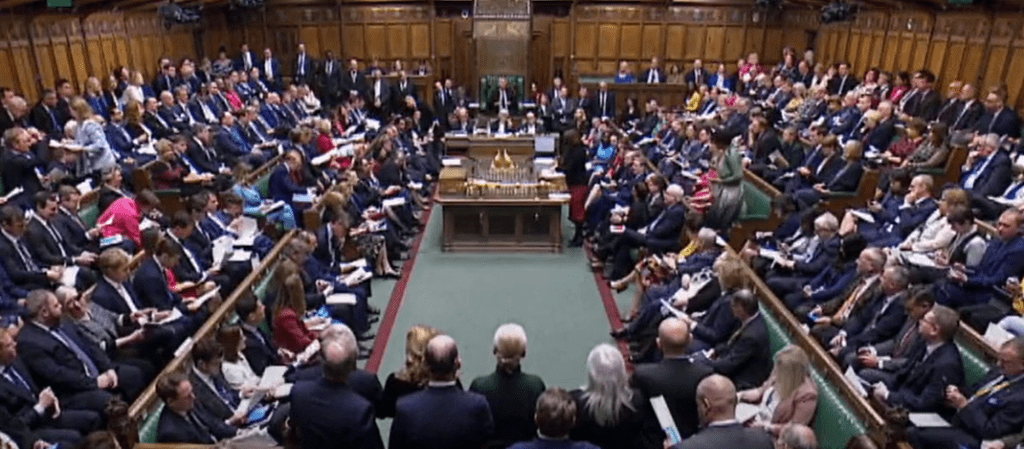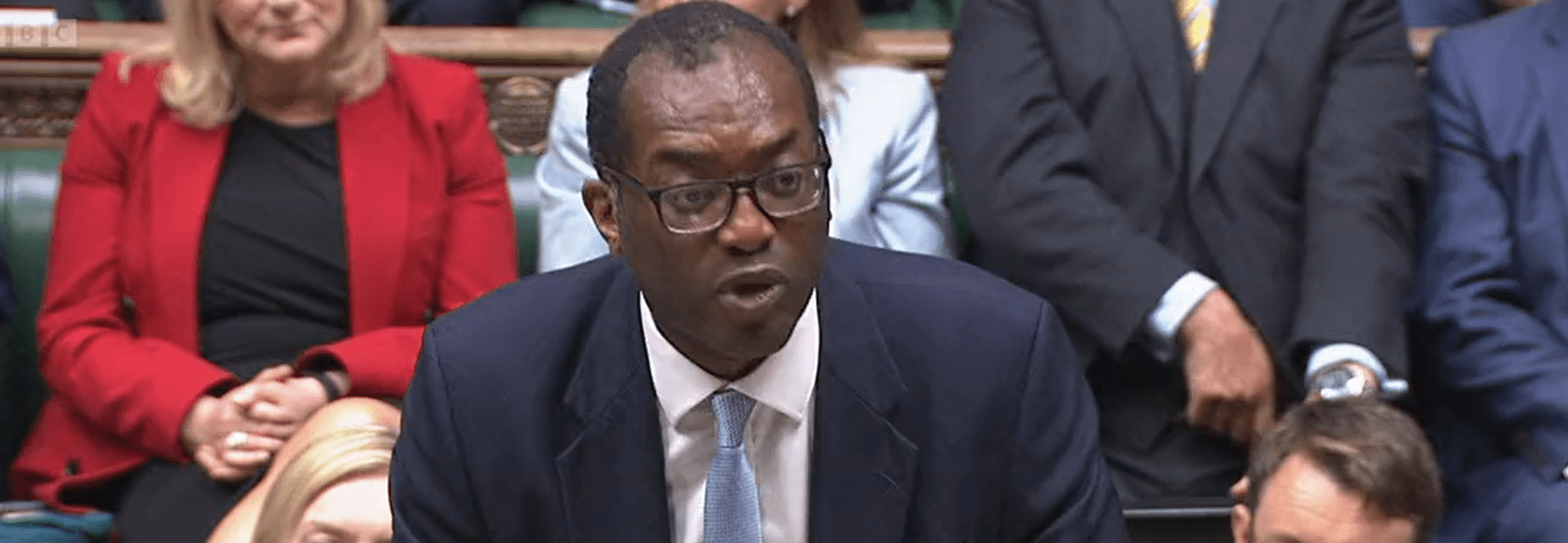If there was any doubt at all that this is a government of the rich, for the rich and by the rich, Kwasi Kwarteng’s mini budget has blown that illusion sky-high. His proposals are designed to support the rich and super-rich, a tiny, one could say a vanishingly small, proportion of the population. It is Robin Hood in reverse, taking from the poor and giving to the rich.
Kwarteng has abolished the top rate of income tax. It means that those earning over £150,000 a year will now pay the same rate of tax as those earning just £50,000. If you are one of the lucky minority, therefore, who earn a million pound a year, you will get twice as much, just in tax relief, as a typical worker earns before tax.
Corporation tax in the UK is already lower than the average of the top G7 countries, but it will be reduced further, from 25% to 19%, allowing companies to give out more to shareholders and pay bosses bigger bonuses. It will make no difference to investment or the wages of workers.
Combined with lifting the cap on bankers’ bonuses, this is the most blatantly pro-wealthy budget for years, eclipsing even those of Tory Chancellors like Osborne and Javid. The only winners are bankers, hedge-fund managers, company bosses and other assorted fat-cats and social parasites.
Most of the Tory cabinet are extremely rich in their own right and will benefit handsomely. The richest MP, former Chancellor Rishi Sunak, will gain millions by paying less tax, while cleaners and other staff in the House of Commons will be worse off.
Wealthy are showered with more money
At the same time as lining the pockets of the rich, Kwarteng and Truss are cutting back on welfare benefits. The wealthy are showered with money but the Tories are proceeding to impoverish of the big majority of the population. The welfare state, once a safety net ‘from the cradle to the grave’ is already failing for most of the poorest in society; they can no longer rely on state welfare and it is charity that is having to fill the gap, as best it can.
Even Gordon Brown, former Labour Prime Minister and by no means a radical, pointed out in a tweet that an international charity, the Human Relief Foundation, which works “on projects that relieve human suffering in some of the most deprived regions of the world”, has opened a food bank in Birmingham. Even charities are running out of cash and food banks are getting fewer donations, because they have always relied on the generosity of other working class people, and for everyone there is simply less cash to go around.
Those who do rely on benefits are going to be harassed and badgered even more, as ‘rules’ are tightened up on ‘job-search’ obligations. Around 120,000 of those on Universal Credit will be asked to ‘take steps’ or ‘seek more work’ or face having benefits reduced. Tory help for the poorest means giving with one hand and taking back – only more – with the other.
Whereas during the Great Depression of the 1930s, most of the poor were unemployed, today most benefit claimants are the working poor. And whereas the labour movement takes the attitude that low-paid workers should get pay rises that match cost of living increases – that is the reason for the spate of strikes across all sectors of the economy – the Tories are demanding that workers make ends meet by taking second or third jobs.
Energy prices are ‘frozen’ at a far higher level than last year
The much-trumpeted measures to help the least well off cope with energy price rises are little more than a sick joke. Even the reversal of the rise in National Insurance, nowhere near enough to compensate a pay packet for an inflation rate in double figures, will benefit the rich more. A typical worker might be around £8 a year better off, but the richest will benefit to the tune of £1,800!
To offset the millions being given to the rich, workers benefitting from the cut in the basic rate of tax, will be better off by the princely sum of around £3.30 a week. The headline measure – holding the cap on energy prices – is not a ‘freeze’, but a temporary hold at a far higher level than before. Far from being threatened by wind-fall taxes, the energy companies will instead have their astronomical profits guaranteed at tax payers’ expense.

The net result of this budget will be an even greater divide between the wealthy and the rest of the population, in a country where the gap between rich and poor is already greater than for similar economies. Jeremy Corbyn popularised the idea that Labour’s policies should be “For the Many, not the Few” and the divisions between the 99% and the 1% are becoming starker with each passing month.
Liz Truss and Kwasi Kwarteng claim that the budget will end the ‘vicious cycle of stagnation’ of the British economy, but it will do nothing of the sort. All the evidence shows that this massive give-away to the rich will make no difference to investment or the prospects for the British economy. Despite all the tax-handouts already given by the Tories in the last ten years, investment in the British economy is stagnating as money goes into speculation, property, take-overs, and finds its way off-shore.
The British economy is already in recession and there is only one strategy that matters to the capitalist class – increasing profit at the expense of working people. The relentless drive to maintain the rents, interest and profits inevitably means the pauperisation of millions of workers.
The generalised impoverishment will have enormous political significance
There is a new poor in this country: increasingly it includes millions of households and workers who in the past would have thought of themselves as at least reasonably well off, and managing to keep their heads above water. But the insecurity and financial uncertainty that has characterised the lives of a relatively small number of working class households will become the general pattern for the majority of the population. That in itself is of enormous political significance. It will shake up the political attitudes and the consciousness of millions, and they will seek new and radical solutions to the problems they faces.
There is a growing contradiction between, on the one hand, the objective economic climate, the insecurity, and impoverishment of workers, and, on the other hand, the Tory-lite policies of the Labour leadership. One poll after another shows public support for radical policies, including the public ownership of utilities like energy, water, rail and Royal Mail, but the entire emphasis of the Labour front bench is for the maintenance of the capitalist status quo and for an illusory “pro-business, pro-worker approach” (Rachel Reeves, in the Financial Times).
The economic imperative of the next few years will create stress fractures of historic proportions in the Labour Party, between those, mostly MPs, who are political representatives of capitalism and a trade union and CLP rank and file who will demand measures in the interests of workers.
Meanwhile, for those workers organised in trade unions the budget will have a dramatically polarising effect. The blatant class bias of the Tories will not go unnoticed or unanswered. Whatever laws might be introduced to try to hamstring the unions, there will be even greater waves of industrial unrest than we have had up to now. It is not the left or the labour movement who create social unrest and upheaval; it is the Tories and their system. Our job is to find a way out of the inevitable chaos that capitalism brings.



